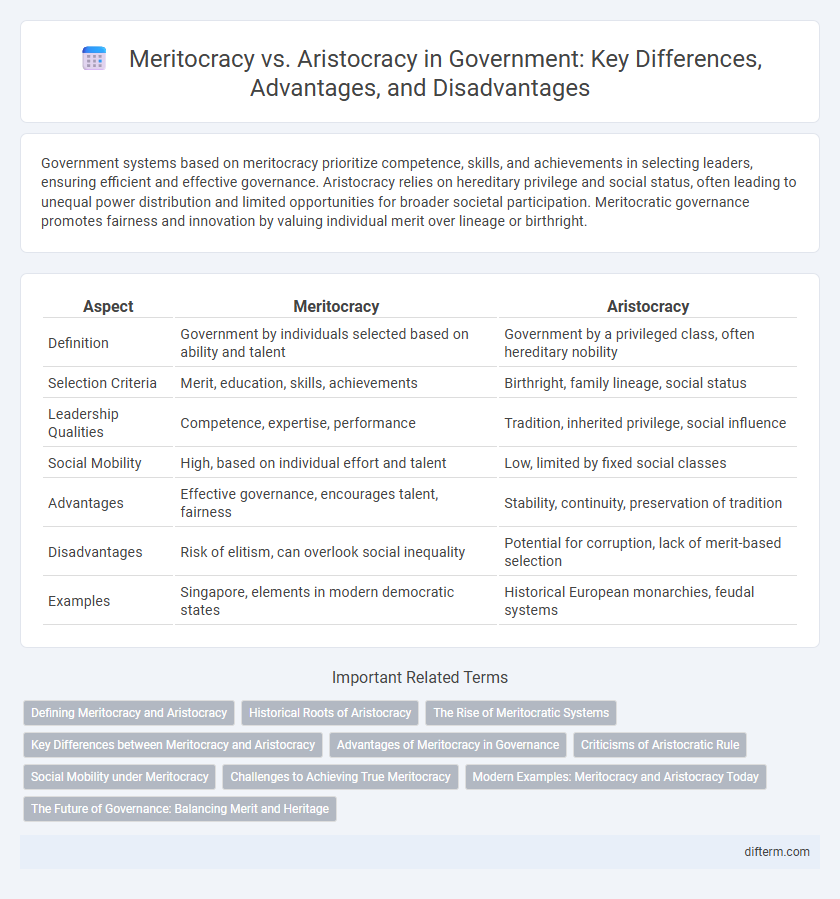Government systems based on meritocracy prioritize competence, skills, and achievements in selecting leaders, ensuring efficient and effective governance. Aristocracy relies on hereditary privilege and social status, often leading to unequal power distribution and limited opportunities for broader societal participation. Meritocratic governance promotes fairness and innovation by valuing individual merit over lineage or birthright.
Table of Comparison
| Aspect | Meritocracy | Aristocracy |
|---|---|---|
| Definition | Government by individuals selected based on ability and talent | Government by a privileged class, often hereditary nobility |
| Selection Criteria | Merit, education, skills, achievements | Birthright, family lineage, social status |
| Leadership Qualities | Competence, expertise, performance | Tradition, inherited privilege, social influence |
| Social Mobility | High, based on individual effort and talent | Low, limited by fixed social classes |
| Advantages | Effective governance, encourages talent, fairness | Stability, continuity, preservation of tradition |
| Disadvantages | Risk of elitism, can overlook social inequality | Potential for corruption, lack of merit-based selection |
| Examples | Singapore, elements in modern democratic states | Historical European monarchies, feudal systems |
Defining Meritocracy and Aristocracy
Meritocracy is a system of government where individuals advance based on their abilities, skills, and achievements, promoting leadership through demonstrated competence and performance. Aristocracy, in contrast, is a form of governance where power is vested in a privileged class or hereditary elite, emphasizing lineage and social status over individual merit. These two models represent fundamentally different approaches to political authority, with meritocracy aiming for equal opportunity and aristocracy maintaining established hierarchies.
Historical Roots of Aristocracy
Aristocracy, rooted in ancient civilizations such as Greece and Rome, established governance by hereditary elites with exclusive political power based on lineage and land ownership. This system contrasted sharply with meritocracy, which emphasizes individual talent and achievement as criteria for political leadership. Historical aristocracies often maintained social hierarchies that limited upward mobility, reinforcing privileged classes through institutionalized inheritance rather than meritocratic selection.
The Rise of Meritocratic Systems
Meritocratic systems have increasingly replaced aristocratic rule by emphasizing talent, education, and achievement over hereditary privilege in government appointments and leadership roles. This shift promotes social mobility and efficiency through objective evaluation mechanisms such as competitive examinations and performance-based assessments. The rise of meritocracy correlates with modernization, industrialization, and democratic reforms that value equal opportunity and competence in public administration.
Key Differences between Meritocracy and Aristocracy
Meritocracy emphasizes leadership based on individual talents, achievements, and qualifications, promoting equal opportunities for advancement regardless of social background. Aristocracy centers power on hereditary privilege and noble lineage, often limiting governance roles to a select class based on family status. The key difference lies in meritocracy's focus on earned merit and competence, contrasting with aristocracy's reliance on inherited social rank and tradition.
Advantages of Meritocracy in Governance
Meritocracy in governance promotes efficiency by selecting leaders based on talent, skills, and achievements rather than birthright, resulting in more competent decision-making. It encourages social mobility and equal opportunity, reducing nepotism and corruption often associated with aristocratic systems. Transparent merit-based selection processes foster public trust and accountability, which are essential for effective governance and sustainable development.
Criticisms of Aristocratic Rule
Aristocratic rule often faces criticism for perpetuating social inequality and limiting political participation to a privileged few, undermining the principles of democracy and meritocracy. This system can lead to entrenched power structures where leadership is based on birthright rather than individual talent or achievement. Critics argue that meritocracy promotes fairness and efficiency by selecting leaders based on ability and performance rather than hereditary status.
Social Mobility under Meritocracy
Social mobility under meritocracy enables individuals to advance based on talent, effort, and achievements rather than birthright or social class. This system fosters equal opportunities, allowing a diverse range of citizens to participate in governance and leadership roles. Meritocratic governance tends to promote innovation and efficiency by rewarding competence and performance.
Challenges to Achieving True Meritocracy
Achieving true meritocracy in government faces challenges such as entrenched social hierarchies, biased access to education, and systemic favoritism that reinforce aristocratic privileges. Institutional barriers often hinder equal opportunity, making it difficult to reward talent and effort purely on merit. Political patronage and nepotism further undermine merit-based appointments, perpetuating inequality and limiting social mobility.
Modern Examples: Meritocracy and Aristocracy Today
Modern meritocracies, such as Singapore and South Korea, emphasize talent, education, and achievement as the primary criteria for leadership and social mobility. In contrast, contemporary aristocracies like the United Kingdom retain hereditary titles and privileges, although with diminished political power compared to the past. These systems illustrate ongoing tensions between merit-based governance and inherited status within modern governments.
The Future of Governance: Balancing Merit and Heritage
The future of governance demands an innovative balance between meritocracy, which emphasizes individual talent and achievement, and aristocracy, which values heritage and established social structures. Emerging political models seek to integrate merit-based appointments with respect for historical institutions to foster stability and inclusivity. Technology-driven decision-making platforms and transparent criteria for leadership selection are key to achieving this equilibrium in modern governance systems.
meritocracy vs aristocracy Infographic

 difterm.com
difterm.com